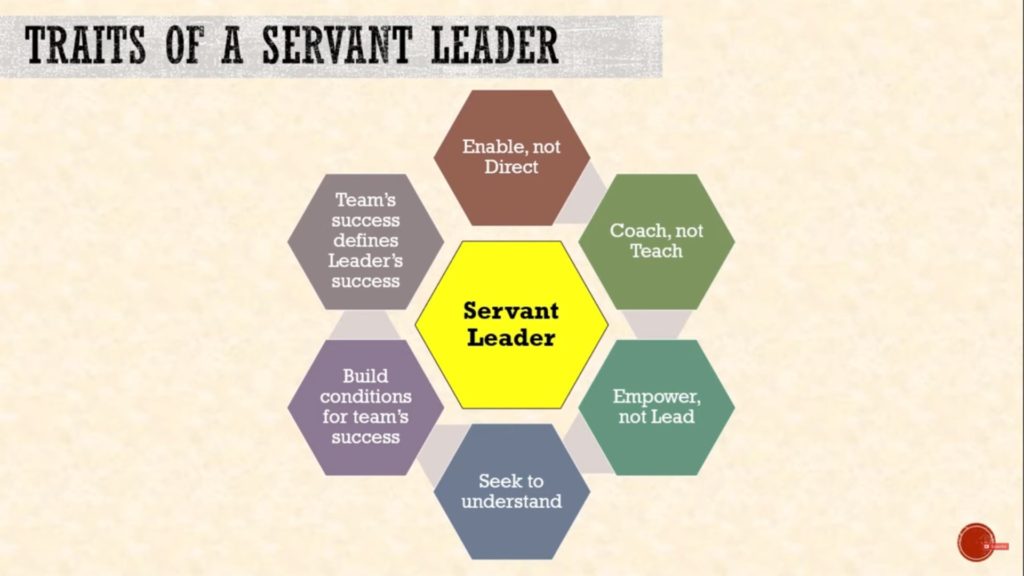Last updated on March-2024 by Nilotpal Ray, PMP
What are the 6 key principles of Servant Leadership?
Let us consider the following scenario:
An employee has made a mistake in data reporting, which has caused a massive rework in a project, including a cost upcharge of $40,000.
Autocratic/Traditional Leader: “This is not expected of you. I am disappointed. Do what it takes to fix it, else I will make sure that this reflects in your performance assessment this year.”
Servant Leader: “Let’s acknowledge the mistake. Let me sit with you to understand why this has happened and what help you need from me to make sure this does not happen in the future. Also, let’s work together to see how we can minimize the impact of this rework.”
Result of 1st response: A demotivated, fearful employee who will never put themselves forward to take responsibility in the future.
Result of 2nd response: An accountable and empowered employee willing to work with the leader to acknowledge the issue, solve it and prevent reoccurrence in the future.
Servant Leadership is a critical component of leadership to enable a team’s success while managing projects in the modern world.
Whether you are leading an agile, hybrid, or traditional project team, you have to abide by the key principles of Servant Leadership to build self-sufficient teams who can perform at their peak without you micro-managing them.
Also, if you are preparing for global certification exams such as the PMP Certification, CAPM Certification, PMI-ACP Certification, PRINCE2 Practitioner, etc., Servant Leadership is becoming an increasingly important topic in which aspirants get tested.
When a project manager or leader prioritizes the needs of the people they are managing before their own, we use the phrase “servant leadership.” They have a desire to serve their team and customer and provide others the chance to make a difference rather than being motivated by power, wealth, or prestige. To get a clearer understanding of servant leadership, it is important to understand the 6 key principles which govern Servant Leadership.
The 6 Key Principles which make a Servant Leader:

Management Principle 1: A Servant Leader should ENABLE, not DIRECT:
A servant leader should enable and not direct. This means that a leader should not tell the employees what to do or how to do a task or a project, instead should enable them with the right thought process and mindset, the right training, staffing, and most importantly right resources because these things will help the employees to be self -sufficient and fulfill different tasks related to a project on their own.
The goal of a servant leader should be to build self-sufficient teams who are capable of working independently without the leader telling them what to do and interfering in their day-to-day tasks, and a leader should ensure this by staffing the right people with the right skill set for project execution. The leader should be available for help and guidance if the employees face any challenges during the project and are there to break any barriers the team might face.
Management Principle 2: A Servant Leader should COACH, not TEACH:
A servant should be more of a coach than a teacher. The difference between a coach and a teacher is that a coach focuses on experiential learning and developing the team member’s skills and helping them gain practical experience by coaching them. In contrast, a teacher focuses on providing theoretical knowledge from books and giving them direct feedback.
For Example, if you are learning a new subject, then a teacher will focus on imparting knowledge by giving lectures and will not focus on one individual; on the contrary, a coach, in this case, will ask you to read the subject matter for better understanding and then have discussions on the topic and clear doubts around it. A coach will not spoon-feed the student but instead guide him and focus on his development as a whole.
Management Principle 3: A Servant Leader should EMPOWER, not LEAD:
A quality that a servant leader must possess is to “empower, not lead.” A servant leader should always pay attention to the empowerment of the team by using the correct tools in their arsenal to succeed.
A leader usually possesses great decision-making skills, but a good servant leader would never make a decision on his own and impose it on the team members, he would rather encourage the team members to participate in the decision-making process by having open discussions within the team and consider everyone’s point of view, and they arrive at a decision, and he will always empower the team to make right and better decisions by providing them the right training and getting right and experienced people on the team to help the team.
A servant leader would never praise himself or say, “You’ll have to follow this decision because I know it’s the best decision.” Mostly he’ll start the decision-making process by asking the team questions like “what do you think is the solution to this problem?” and take input from the team members. In other words, a servant leader helps build the team members’ decision-making ability by letting them understand the current situation and involving them in decision-making by taking their suggestions during the project to make a certain situation better.
Management Principle 4: A Servant Leader should SEEK to UNDERSTAND:
A servant leader should understand the aspect of seeking to understand. This means he should never be opinionated and should always seek to understand a problem before arriving at any decision or taking any step to rectify it.
For example, if a particular team member is not performing in a project, the first step of the servant leader should be to understand the underlying cause of the team member’s poor performance, like is it due to lack of training or the member is feeling demotivated or is he not assigned the correct role according to his skills and abilities, etc. and then taking action. The main focus lies in finding the root cause of a problem and reaching a solution.
Management Principle 5: A Servant Leader should focus on building conditions for the Team’s success, the Team is not expected to deliver by default:
A servant leader should build conditions for the team’s success. A servant leader should help break barriers and challenges in a team’s success and provide them with the correct environment and conditions to succeed. A good leader ensures that the team brings out their best potential by providing the conditions in which they can thrive.
For example, Let’s suppose in a project an important approval is pending with the government authorities and is stuck in the red tape of bureaucracy; at such a time, a servant leader should work towards finding out the channels and influencing and talking to the correct people and creating an influence from lobbyists if required to get the approval on time making sure the project moves forward, and the team can take care of the project after that point.
Management Principle 6: A Servant Leader should know that their success is measured by the Team’s success
A servant leader should be aware of the fact that the team’s success defines the leader’s success and not vice versa.
Therefore, if the team succeeds, then the team leader has succeeded in managing the team and in other aspects as well, but if the team fails, then it is the failure of the servant leader as well. The failure of the team reflects the shortcomings of the servant leader. A good servant leader will never take credit for all the work that led to the project’s success in front of the supervisors, or he will never act as a top performer even if his team is not performing well.
For example, when it comes to rating and promotions, a servant leader should project the entire team in good limelight and should not put himself first as a contender for promotions and progressions if the team members are deprived of the required recognition for the work that they have put in. A servant should never say that ‘he’ made the project a success but instead should say the project’s success is due to the team’s collective efforts.
PMP/CAPM Questions on Servant Leadership:
These six traits mentioned above should be clearly understood and internalized as these will help an aspirant answer many questions in the PMP/CAPM exam correctly.
To ensure a proper understanding of the topic, some practice questions are mentioned below along with the strategy on how to solve them.
If you are preparing for the PMP Certification Exam, you might want to check out the PMP Exam eligibility criteria or the PMP Exam passing score here.
PMP/CAPM Question-1 on Servant Leadership:
You have been appointed as a project manager for reverse engineering a razor packing machine for A&B Co. As the primary scope of the project, you need to benchmark & reverse engineer a similar type of machine from one of the sister plants of A&B Co. in St. Petersburg. This requires a few of your team members to travel to St. Peterburg, stay there for a couple of weeks, strip the machine apart & create drawings + 3D models for each of the critical components. However, your travel budget is very limited, and you can send only 3 members of your team. Your team consists of 12 people, including junior-level managers, technicians, 3D modeling experts & engineering drawing staff. What is the best way you should select the 3 members from the team as per project requirements?
- You are an experienced PM for these projects, and you have handled benchmarking visits before. You will handpick 3 people from the team as you deem fit.
- You should send only the top-level staff (Ex. The managers & senior techs.). In the end, you know that you need to depend on them for the project success hence they should be kept happy.
- You will call a meeting with the entire team, explain them the situation, and communicate the budget constraints and the success criteria the project needs to deliver. Accordingly, you ask the team to come up with nominations/proposals.
- Go back to your management & ask for more travel funding since it is critical that to deliver the success criteria of the project, you need to send as many team members as possible
Option 1: In the above question the first option tells us that the leader decides for the team and rolls it out accordingly, and as we learnt above this is not a quality of a servant leader. A servant leader never decides for the team and rolls it out to them. Therefore, option 1 is incorrect.
Option 3: seems a fairly good option and is the correct option because it states that the leader will call in a meeting and explain them the situation and communicate the budget constraints and explain the success criteria and then will ask the team to come up with nominations and proposals. Overall, it captures a lot of dimensions of a good servant leader, as in this the servant leader is not deciding for the team and letting them make decisions and be accountable for it as well.
Option 4: is incorrect because the servant leader cannot go back to the management and ask for extra funding for travel and it is not a good sign of a servant leader that he is not able to manage the funds and wants to send as many team members as possible. It is not a good way to work on a project. Only members who will add value to the project should be sent for the project.
PMP/CAPM Question-2 on Servant Leadership:
Rowan is the project manager for rolling out COVID-19 vaccination program for Guy’s & St. Thomas Hospital in London. He is leading a team of doctors, nurses, legal and ethical consultants. There has been instances (in other hospitals in the UK) where breach of patient confidentiality has left the vaccination program in jeopardy, hence the Trust is particularly keen on understanding what measures Rowan is taking to mitigate the risks. What should be Rowan’s strategy here to come up with an effective patient confidentiality strategy?
- Rowan can benchmark with other hospitals/trusts and learn from there experience. Then he can rollout the same within his team for deployment.
- Rowan needs to involve his team of doctors, nurses, ethical & legal consultants to design a strategy & then benchmark the same with other trusts to identify gaps & improvements.
- He should ask the Trust for help & let them provide guidelines for patient confidentiality that is expected out of the project team. It makes sense because the Trust is the primary stakeholder.
- Rowan should study UK’s patient confidentiality guidelines & develop a plan accordingly. This can be rolled out to the team at a later stage.
Option 1: states that Rowan can benchmark with other hospitals, now in a way it is good and then he can roll out the same with his team for deployment, now this strategy is very individualistic, now he is benchmarking with other hospitals which is good, now he is rolling it to his team for deployment and this is not good as you don’t expect this from a servant leader because a servant leader is always inclusive when it comes to decision making. Hence this option is incorrect.
Option 2: is a step ahead of option 1 as it states that before Rowan does the benchmarking he’ll involve his team of doctors, nurses, and other consultants, this way it is bit more inclusive, as Rowan is taking inputs from his team members and then does the benchmarking. This is the correct option.
Option 3: says that Rowan should go to the trust and ask for the help and then provide guidelines because they are the primary stakeholders, and this is where the option becomes wrong because the trust is not the primary stakeholder when it comes to patient confidentiality. Also, it doesn’t take into account the inclusiveness of the servant leader.
Option 4: In this option Rowan is deciding for himself and imposing his decision on the team, and is not including his team in decision making. This type of behavior is not a trait of a servant leader. Therefore, this option is incorrect.
Hope you enjoyed reading the article. If you are preparing for your PMP Exam, don’t forget to check out my Udemy Courses and PMP Masterclass Sessions as below:
The last one is the best if you are struggling to learn EVM during your PMP and CAPM preparation.
Cheers and I will talk to you soon!
Ray

